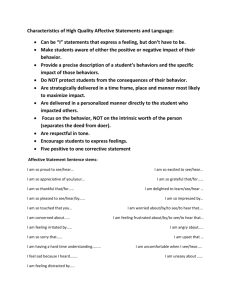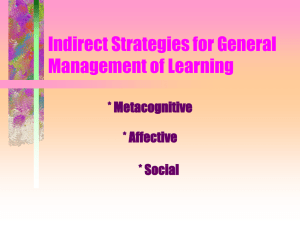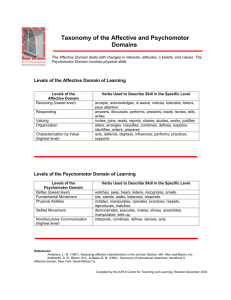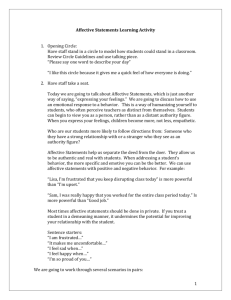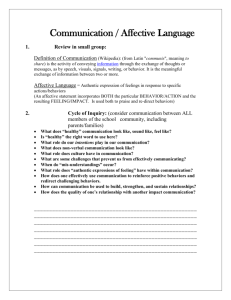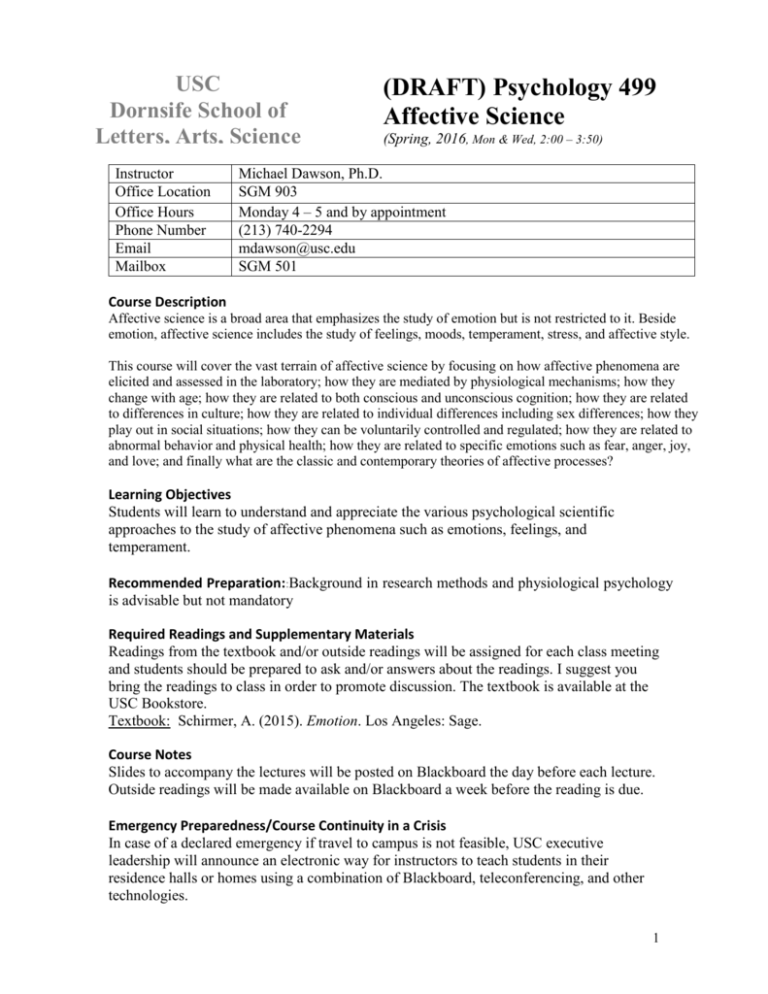
USC
Dornsife School of
Letters, Arts, Science
Instructor
Office Location
Office Hours
Phone Number
Email
Mailbox
(DRAFT) Psychology 499
Affective Science
(Spring, 2016, Mon & Wed, 2:00 – 3:50)
Michael Dawson, Ph.D.
SGM 903
Monday 4 – 5 and by appointment
(213) 740-2294
mdawson@usc.edu
SGM 501
Course Description
Affective science is a broad area that emphasizes the study of emotion but is not restricted to it. Beside
emotion, affective science includes the study of feelings, moods, temperament, stress, and affective style.
This course will cover the vast terrain of affective science by focusing on how affective phenomena are
elicited and assessed in the laboratory; how they are mediated by physiological mechanisms; how they
change with age; how they are related to both conscious and unconscious cognition; how they are related
to differences in culture; how they are related to individual differences including sex differences; how they
play out in social situations; how they can be voluntarily controlled and regulated; how they are related to
abnormal behavior and physical health; how they are related to specific emotions such as fear, anger, joy,
and love; and finally what are the classic and contemporary theories of affective processes?
Learning Objectives
Students will learn to understand and appreciate the various psychological scientific
approaches to the study of affective phenomena such as emotions, feelings, and
temperament.
Recommended Preparation::Background in research methods and physiological psychology
is advisable but not mandatory
Required Readings and Supplementary Materials
Readings from the textbook and/or outside readings will be assigned for each class meeting
and students should be prepared to ask and/or answers about the readings. I suggest you
bring the readings to class in order to promote discussion. The textbook is available at the
USC Bookstore.
Textbook: Schirmer, A. (2015). Emotion. Los Angeles: Sage.
Course Notes
Slides to accompany the lectures will be posted on Blackboard the day before each lecture.
Outside readings will be made available on Blackboard a week before the reading is due.
Emergency Preparedness/Course Continuity in a Crisis
In case of a declared emergency if travel to campus is not feasible, USC executive
leadership will announce an electronic way for instructors to teach students in their
residence halls or homes using a combination of Blackboard, teleconferencing, and other
technologies.
1
Psyc 499-16
Grading Breakdown
Course Requirement
Midterm Exam
Final Exam
Short term paper
Class participation
Points
100
100
45
45
% of Grade
35
35
15
15
Total
290
100
Grading will not be based on a curve (it is possible for everyone, or no one, to get an A).
94-100 = A; 90-93 = A-; 87-89 = B+; 83-86 = B; 80-82 = B-; 77-79 = C+; 73-76 = C; 7072 = C-67-69 = D+; 60-66 = D; below 60 = F. Points earned will be posted throughout the
semester.
Description and Assessment of Assignments
1. The midterm exam will cover material from the beginning of the course up to the
point of the exam. It will consist of a combination of multiple choice questions and
short essay questions. Examples will be given in the review lecture.
2. The final exam will cover material from the entire course but with an emphasis on
the material presented after the midterm. It will consist of a combination of
multiple choice questions and short essay questions. Examples will be given in the
review lecture.
3. The short term paper is to be a substantive original paper of 5 – 6 pages (double
spaced in 12 point font). The paper must cite at least 5 references in the scientific
literature. The topic is your choice as long as it is relevant to material in the class
and approved in advanced by the instructor. An electronic version and a hard copy
must be turned by the last class meeting (late papers cannot be accepted).
4. Your class participation is an important part of the course. It is therefore
important that you carefully read the assigned material and that you come to class
prepared to ask and/or answer questions about the material.
Academic Conduct
Plagiarism – presenting someone else’s ideas as your own, either verbatim or recast in your
own words – is a serious academic offense with serious consequences. Please familiarize
yourself with the discussion of plagiarism in SCampus in Section 11, Behavior Violating
University
Standardshttps://scampus.usc.edu/1100-behavior-violating-universitystandards-and-appropriate-sanctions/. Other forms of academic dishonesty are equally
unacceptable. See additional information in SCampus and university policies on scientific
misconduct, http://policy.usc.edu/scientific-misconduct/.
Discrimination, sexual assault, and harassment are not tolerated by the university. You are
encouraged to report any incidents to the Office of Equity and Diversity
http://equity.usc.edu/
or
to
the
Department
of
Public
Safety
http://capsnet.usc.edu/department/department-public-safety/online-forms/contact-us. This
is important for the safety whole USC community. Another member of the university
community – such as a friend, classmate, advisor, or faculty member – can help initiate the
report, or can initiate the report on behalf of another person. The Center for Women and
Men http://www.usc.edu/student-affairs/cwm/ provides 24/7 confidential support, and the
sexual assault resource center webpage sarc@usc.edu describes reporting options and other
resources.
Syllabus for Psyc 499 Page 2 of 3
Psyc 499-16
Support Systems
A number of USC’s schools provide support for students who need help with scholarly
writing. Check with your advisor or program staff to find out more. Students whose
primary language is not English should check with the American Language Institute
http://dornsife.usc.edu/ali, which sponsors courses and workshops specifically for
international graduate students. The Office of Disability Services and Programs
http://sait.usc.edu/academicsupport/centerprograms/dsp/home_index.html
provides
certification for students with disabilities and helps arrange the relevant accommodations.
If an officially declared emergency makes travel to campus infeasible, USC Emergency
Information http://emergency.usc.edu/will provide safety and other updates, including
ways in which instruction will be continued by means of blackboard, teleconferencing, and
other technology.
Syllabus for Psyc 499 Page 3 of 3
Psyc 499-16
Schedule of Class Topics, Readings, Examinations, and Assignments
DAY DATE
1
2
TOPIC
ASSIGNMENT
1/11
1/13
1/18
1/20
1/25
1/27
2/1
Overview of course and class requirements
What is affective science? Early theories
Martin Luther King Day
How are affective processes elicited in the lab? 1
How are affective processes elicited in the lab? 2
How are affective processes measured in the lab? 1
How are affective processes measured in the lab? 2
10
2/3
2/8
2/10
2/15
2/17
Theories of emotions and affective processes
Classification of emotions
Evolution, emotion, and affective processes
Presidents Day
CNS and peripheral nervous system
11
2/22
12
13
2/24
3/2
Autonomic Nervous System and affective
processes
Brain and affective processes
Brain and affective processes
14
3/7
15
3/9
16
17
18
3/14
3/21
3/23
Consciousness and affective processes
Review for midterm exam
Mid-Term Exam
Spring Recess
Cognition and affective processes 1
Cognition and affective processes 2
Regulation of affective processes
19
20
3/28
3/30
Neurobiology of affective regulation
Conditioned emotions and affective processes
21
22
4/4
4/6
Specific emotion: Fear and anxiety
Fear, amygdala, and startle
23
24
4/11
4/13
Specific emotion: Sadness
Affective processes and physical and mental health
Pp 276 - 286
Outside reading
Pp 204 - 216
Pp 216 - 229
Outside reading
Pp 178 - 202
Outside reading
25
26
4/18
4/20
Culture & affective processes
Sex differences in emotion & affective processes
Pp 185-195
Pp 203-215
27
28
4/25
4/27
Specific emotion: Joy and Love
Age and affective processes
Review for final exam
FINAL EXAM
Pp 151 - 177
Pp 289 – 318
Term Paper Due
3
4
5
6
7
8
9
29
Pp 1 - 19
Pp 102 - 116
Pp 116 - 124
Pp 125 - 134
Pp 134 – 138
Outside reading
Pp 20 - 41
Pp 42 - 69
Outside reading
Pp 73 - 87
Pp 137 – 139
Outside reading
Pp 87 - 101
Pp 138 - 150
Outside reading
Pp 233 – 242
Pp 242 - 262
Pp 263 – 276
Syllabus for Psyc 499 Page 4 of 3

